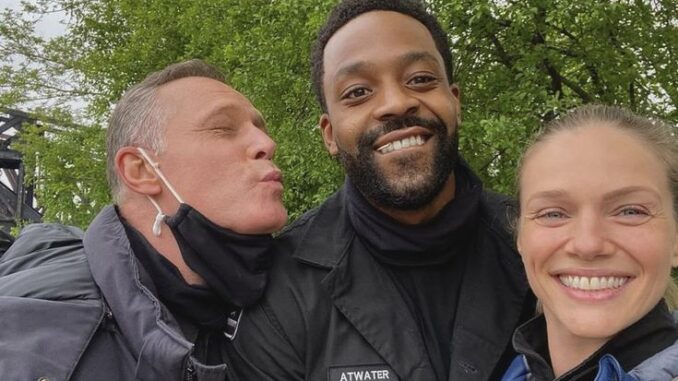
In the aftermath of Chicago P.D. Season 12’s explosive confrontation between Hank Voight and serial killer Paul Reid, showrunner Gwen Sigan dropped a bombshell: had Alvin Olinsky still been alive, he could have stopped Voight from pulling the trigger. It’s a compelling theory — one that touches deep into the legacy of one of Chicago P.D.’s most beloved characters. But while it’s a romantic notion, the idea that Olinsky could have truly prevented Voight’s darkest moment doesn’t quite hold up under scrutiny.
Season 12 pushed Voight to a place we’ve rarely seen him. The pursuit of Reid, a killer who had eluded the Intelligence Unit for weeks, was not just professional — it was personal. The gruesome nature of the crimes, combined with Voight’s long history of justice-at-any-cost, culminated in a chilling moment where he took justice into his own hands.
After cornering Reid in a deserted alley and hearing yet another smirk-laced taunt, Voight didn’t hesitate. He made a final, fatal decision — one that will likely haunt him for seasons to come. Alvin Olinsky, Voight’s closest friend and moral compass, was tragically killed in Season 5 — a death that many fans still haven’t forgiven the writers for. A seasoned detective with street smarts, empathy, and a deep bond with Voight, Olinsky served as both confidant and quiet challenger to the unit’s volatile leader. So when showrunner Gwen Sigan suggested that Olinsky’s presence might have changed the course of Reid’s death, it stirred something in longtime viewers. After all, if anyone had the emotional leverage to stop Voight mid-rage, it was Al.
Let’s be clear: Olinsky was a stabilizing force — but not a leash. His loyalty to Voight was undeniable, even in morally gray territory. He stood by him through cover-ups, interrogations gone too far, and decisions that flirted with outright vengeance. Their dynamic was one of mutual trust — but not necessarily one where Al could change Voight’s mind once it was made. In fact, in many of the show’s most ethically murky storylines, Olinsky was complicit. He rarely pulled Voight back — instead, he stood beside him and helped clean up the aftermath. That’s not a man who would always say “stop.” That’s a man who would say “I’m with you.”

Part of what makes Voight’s arc in Season 12 so tragic is how alone he’s become. The loss of Olinsky. The evolving distance between him and his team. The moral gray slowly darkening into black. Reid’s death wasn’t just a failure of judgment — it was a symptom of years of unchecked trauma and loss. In that sense, Sigan’s comment that Olinsky’s presence would’ve changed things may not be entirely literal. Perhaps it’s more symbolic — a nod to how Voight, untethered from emotional anchors, is spiraling.
It’s easy to see why fans would latch onto the “Olinsky would’ve stopped him” idea. It feels like justice, not just for Reid’s victim, but for Al’s memory. Bringing Olinsky into the conversation keeps him alive in the hearts of viewers — and retroactively restores some balance to the narrative. But that’s the tricky part about nostalgia. It simplifies. It elevates memory into myth. Al Olinsky was many things: a brilliant cop, a fiercely loyal friend, a man with his own share of demons. But he wasn’t a savior. And it does a disservice to his complexity to turn him into one.
Rather than imagining what Olinsky might have done, the show would be better served by focusing on the fallout of Reid’s death. The Voight of Season 12 is a man on the edge, not just morally, but emotionally. His relationship with the rest of the Intelligence Unit is fraying. His methods are under increased scrutiny. And without someone like Al to lean on, the cracks are showing. Instead of rewriting history, the show must look forward. Will Voight face consequences? Will he seek redemption? Or will his descent into darkness finally catch up with him?
That said, it’s a testament to Elias Koteas’s performance and the power of the Olinsky character that he still casts such a long shadow over Chicago P.D. years after his death. Al represented a version of the unit that balanced toughness with quiet wisdom, justice with heart. And maybe that’s what we’re really mourning — not just Olinsky, but what he stood for. A unit with boundaries. A partner who didn’t just follow Voight, but steadied him. Still, if there’s one thing we’ve learned from twelve seasons of Chicago P.D., it’s that in this world, nothing is black and white — not justice, not loyalty, and certainly not friendship.
